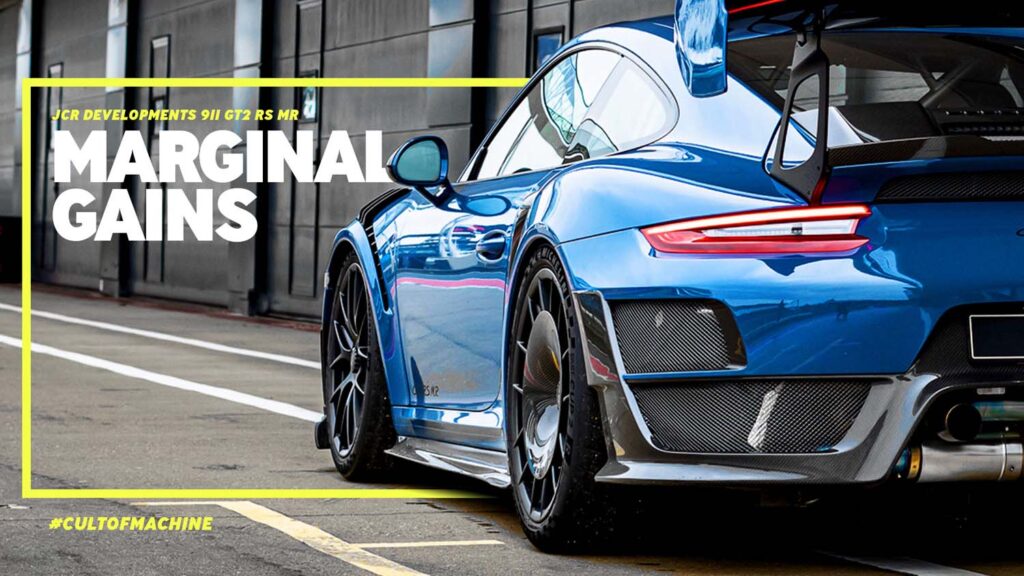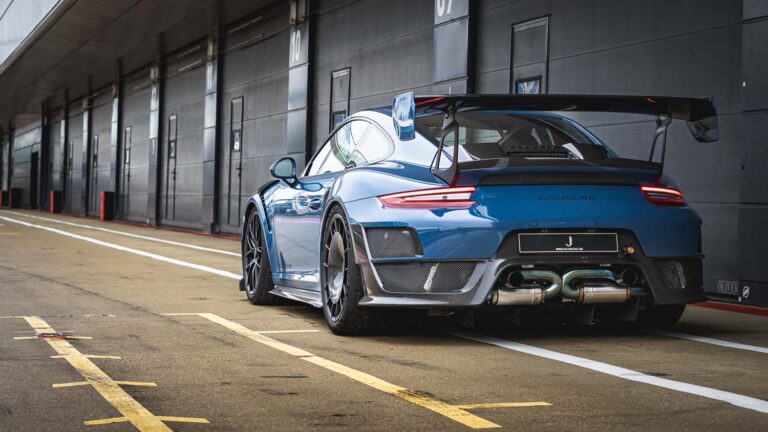What if you were to take an already highly modifed Porsche 911, and then eke out even more performance? You’d end up with this monstrous performance car from JCR Developments.
A rainy, hands-in-pockets November day and a set of well-used track tyres aren’t particularly friendly acquaintances. It’s for this reason that JCR Developments’ wild Porsche 911 GT2 RS MR won’t be venturing out onto Silverstone’s fabled tarmac today to mix with everything from a 3.0-litre diesel Audi A6 to a fully-blown GT3-spec Ferrari 458.
The planned run at Silverstone was just a fraction of a packed schedule of track days that the GT2 RS has been undertaking throughout the UK and beyond during 2022, acting as a testbed to prove the durability of JCR’s performance parts.
With the car garage-bound for now, though, it can enjoy a well-earned day off as eye candy in the Silverstone paddock. Company founder Jonny Cocker, meanwhile, who should have been driving the car, is instead wandering the pits while it sits in the garage being photographed for a Total 911 feature.
JCR – Jonny Cocker Racing, if you were curious – is only a relatively recent chapter of Jonny’s life. You might know his name if you followed international sports car racing around the turn of the last decade, where he ran in multiple cars and series all around the world.
In fact, Cocker was something of a teen prodigy in sports car racing, taking an NGT class victory in the British GT Championship aged 18 in 2004, before winning the Porsche Carrera Cup Asia series the following year.
Cocker’s racing career continued up until his overall second place finish in the 2019 British GT season, but since then, JCR, established in 2014, has become a full-time concern. “We initially started using the Nissan GT-R as the basis of what we did… but the plan was always to transition into Porsche as soon as we could,” says Cocker.
Eight years down the line, this has evidently worked out. Flick through JCR’s website and you’ll find a few parts here and there for Lamborghinis, Focus RSs and the GR Yaris, but the entirely separate tab dedicated to Porsche upgrades is evidence of their dedication to the brand.
It’s not as if Porsches don’t regularly receive an outpouring of praise in the press, and the track ability of their GT-badged cars is rarely called into question. Nevertheless, JCR have dedicated themselves to improving and refining the breed.
Besides certain alloy wheels and suspension components, sourced from the likes of BBS and Öhlins, everything JCR installs is fabricated in house from scratch. Crucially, it’s then put through a vigorous testing programme of track day usage – which is why the GT2 RS is currently running a prototype exhaust system made from Inconel, a superalloy with some very large numbers attached to it in terms of both cost and resistance to high temperatures.
“We gather a lot of data from running the car on track, and it allows us to understand what’s possible in terms of what materials we can use where, and how we can apply the knowledge that we’ve got. We know that now we have that level of reliability and endurance that the parts need to put up with under properly extreme conditions.”
Pretty much every GT- or turbo-badged derivative of 911, Cayman and Boxster from the last 15 or so years, as well as the 918 hypercar, has a host of JCR parts available, and they’re nearly all tested on cars bought in-house. This means JCR must negotiate the infamously tricky waters of availability and allocation of these highly sought-after cars.
As a result, they’re likely to be waiting around a year for an example of the latest 911 GT3 RS, but its baby brother, the 718 Cayman GT4 RS, is keeping them occupied in the meantime. “The 718 platform is really strong, but Porsche still very much position it below the 911 GT3. There’s a lot more that can be done, not only from an aero point of view, but suspension, chassis, and liberating some more power from the exhaust system. We need our own car to be able to develop parts and understand what the car needs.”
These further marginal gains over products that already leave the factory with fastidious engineering behind them are the core of what JCR does. As Cocker describes them, “we’re a niche within a niche. We’re one of the very, very few who go out there, purchase the cars, use them properly on the road and track and develop parts based on that.”
The slow-burn approach is a refreshing take in the often fast-paced world of the modern aftermarket performance world, but given the level of development and calibre of materials used, it unsurprisingly doesn’t come cheap. On the more (relatively) affordable end of the spectrum are the likes of titanium exhaust tips and billet aluminium shift paddles, but start shopping around for some of the full exhaust or suspension systems and you’re well into the realm of an entire second-hand Boxster.
To many GT Porsche owners, though, who likely paid well over the odds for their cars in the first place, this probably isn’t much of a concern. As much as Porsche’s sports cars sit near the top of the road car tree and appease the enthusiasts, they’re fundamentally a side hustle to the SUVs that make the company a mass-market player. They can spend years and years perfecting the power delivery of a naturally-aspirated flat-six, or the complexities of a double-wishbone suspension setup, but they still have to build cars to hit profit margins, meet noise and emissions regulations and be civilised enough to tootle around the W1 postcodes at eight miles per hour.
JCR’s raison d’être is to do the things that Porsche, and a few other brands, can’t necessarily make a case for from the factory, but for which a small but vocal group still clamours for. That they do so with an extraordinary level of craftsmanship and attention to detail has cemented them, in their relatively short history, as an incredibly well-respected cog in the Porsche machine.






























